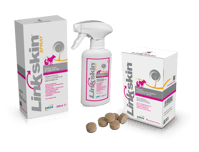
The Microbiome
The microbiome, the complex community of microorganisms living within and on the bodies of animals, plays a pivotal role in maintaining health. In pets, the gut microbiome, composed of bacteria, viruses, fungi, and other microorganisms, is vital not only for digestion but also for regulating immune function. Emerging scientific research has highlighted the significant role the microbiome plays in the development of allergic diseases in pets, including food allergies, atopic dermatitis, and other allergic conditions. Understanding the microbiome’s involvement is crucial for veterinarians looking to improve the treatment and prevention of allergic diseases.
Microbiome and Immune System Regulation
The gut microbiome is central to the development and regulation of the immune system. A diverse and balanced microbiota can help prevent the immune system from overreacting to harmless antigens, thereby reducing the risk of allergic responses. Conversely, an imbalance in the microbiome, known as dysbiosis, has been associated with a variety of allergic diseases in both humans and animals.
Immune System and Allergies
Gut–Immune System Communication
The gut microbiome plays a crucial role in immune system education and regulation, as a significant portion of the immune system resides in the gut-associated lymphoid tissue (GALT). The microbiome communicates with the immune system through signaling pathways, influencing T-cell differentiation and the production of immunoglobulins.
Dysbiosis and Allergies
Dysbiosis, an imbalance in the gut microbiome, has been implicated in allergic diseases, as it can lead to impaired immune responses. Studies have shown that the development of allergic diseases, such as asthma and atopic dermatitis, may be exacerbated by a disrupted gut microbiota, as this imbalance can impair the body's ability to modulate immune responses appropriately.
Research on Gut Microbiome and Allergies
A seminal study by Bäckhed et al. (2005) demonstrated that mice with altered gut microbiota exhibited more severe allergic symptoms compared to those with a balanced microbiome. These findings support the hypothesis that a healthy gut microbiome plays a protective role against allergic conditions by modulating immune function and preventing hypersensitivity.
The Skin Microbiome and Atopic Dermatitis
The skin microbiome, like the gut microbiome, is influenced by both environmental factors and the internal balance of microorganisms. In pets with allergic skin conditions such as atopic dermatitis, changes in the skin microbiome are often observed. Research has shown that allergic conditions can lead to dysbiosis not only in the gut but also on the skin, which may contribute to the severity of the disease.
Gut-Skin Axis
The gut-skin axis refers to the bidirectional communication between the gut microbiome and the skin microbiome. Disruptions in the gut microbiota can influence the skin’s microbial environment, which can exacerbate skin conditions, including allergic dermatitis. Littman et al. (2021) found that dogs with atopic dermatitis had distinct microbiota profiles compared to healthy dogs, suggesting a potential link between gut dysbiosis and allergic skin conditions.
Skin Microbiome in Atopic Dermatitis
In pets suffering from allergic skin conditions, particularly atopic dermatitis, the diversity of the skin microbiome is often reduced. A balanced skin microbiome helps maintain the skin's barrier function, protecting it from harmful pathogens and environmental allergens. An altered microbiome can contribute to inflammation, which worsens allergic reactions. Littman et al. (2021) observed that the skin of dogs with atopic dermatitis was dominated by pathogenic bacteria, further aggravating the inflammation associated with the condition.
Microbiome and Food Allergies in Pets
Food allergies are a common cause of gastrointestinal and skin symptoms in pets, and the gut microbiome plays a role in their development. An imbalance in the gut microbiota may make pets more susceptible to food allergies by altering immune responses to dietary proteins.
Role of Probiotics and Prebiotics
Probiotic supplementation in pets has shown promise in supporting a healthy gut microbiome and potentially alleviating symptoms of food allergies. Probiotics are live microorganisms that confer health benefits when consumed in adequate amounts. Prebiotics, on the other hand, are nondigestible food components that selectively stimulate the growth of beneficial gut bacteria. Hernández et al. (2017) reviewed the potential benefits of probiotics and prebiotics in treating allergic conditions in pets, suggesting that restoring the balance of the gut microbiome could help mitigate allergic reactions.
Dietary Impact on Microbiome Composition
Dietary factors, including the inclusion of prebiotics, probiotics, and certain types of fibers, can influence the composition of the gut microbiome. A diet high in fiber, for example, can promote the growth of beneficial microbes that help regulate immune responses. Rossi et al. (2020) found that dietary changes could alter the microbiota's ability to reduce inflammation and modulate allergic reactions, particularly in pets with food allergies.
Probiotic Use and Therapeutic Potential
Several studies have explored the potential benefits of probiotic supplementation for managing allergies in pets. Hernández et al. (2017) demonstrated that probiotics could reduce inflammation in pets with allergic conditions by promoting a healthy microbiota. Additionally, probiotics may help restore balance in the gut microbiome, improving immune function and alleviating the symptoms of food allergies and atopic dermatitis.
A study by Müller et al. (2021) demonstrated that dogs with atopic dermatitis showed significant improvement after being treated with probiotics. The probiotics helped restore gut microbiota balance, which in turn improved skin health and reduced the severity of allergic reactions.
A more recent study by Olivry et al. (2025) demonstrated that two tyndallized Lactobacilli (L. rhamnosus and L. reuteri), exhibit immunomodulating effects on healthy canine PBMCs in vitro. These probiotics enhanced the production of Th1 cytokines, such as IL-12 and IFN-γ, as well as the regulatory cytokine IL-10, while the influence on the Th2 cytokine IL-4 was minimal. This suggest that these probiotics modulate the immune response and can be helpful adjuvants in the treatment and prevention of relapses of allergic disease in dogs.
Many veterinary dermatologists now recommend probiotics as part of an integrated approach to managing allergic diseases, particularly in pets with chronic skin conditions or food allergies. The potential of probiotics in modulating the immune response and alleviating allergic symptoms has made them a key component in managing allergy-prone pets.
The microbiome plays a central role in the health of pets, particularly in the development and regulation of allergic diseases. Dysbiosis, or an imbalance in the microbiome, is strongly associated with these allergic conditions, suggesting that modulation of the microbiome—through diet, probiotics, or other therapeutic interventions—could provide significant benefits in the management of allergies in pets.
Linkskin
LinkSkin contains tyndalized Lactobacilliprobiotics (L. rhamnosus and L. reuteri). These inactivated probiotics help modulate the skin's microbiome, restoring balance and supporting the skin’s natural defenses. This makes Linkskin a useful adjuvant in the management of allergies. Available as Spray and Tablets. 